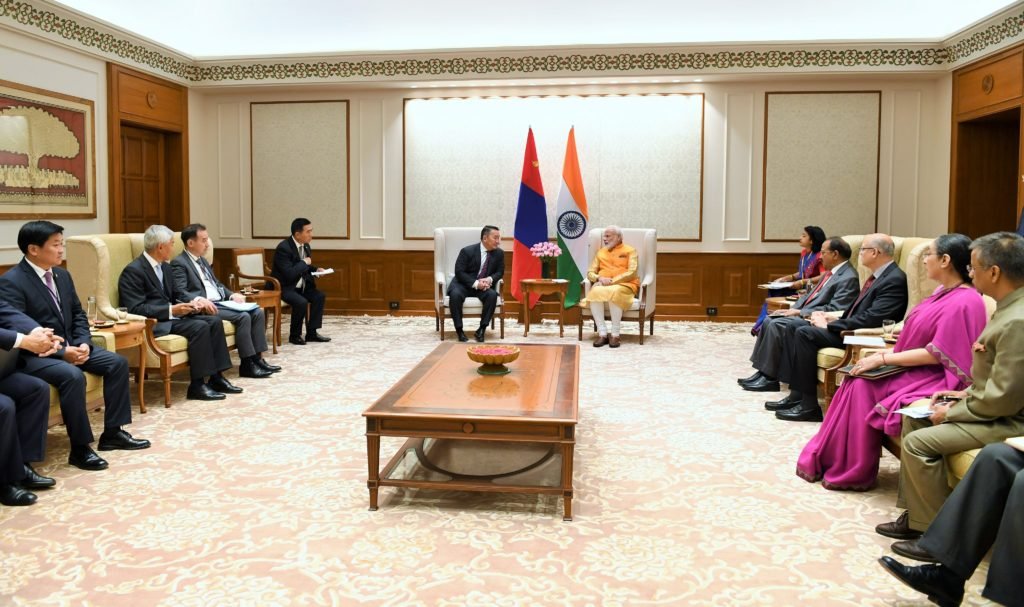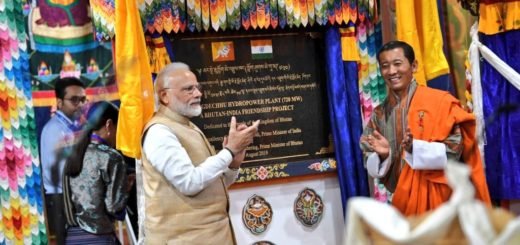Assessing the importance of Mongolia in India’s geopolitics

“There are no permanent friends nor permanent foes in International politics; what permanent is only the National Interest.” This dictum perfectly symbolizes the current world order, fractured, unstable, and in continuous flux. The unpredictability due to the changing dynamics in world politics has caused foreign policy mandarins around the globe to look for new equations with the new players in the game. In this regard, Mongolia’s state has gained importance in the Indian foreign policy circle. India’s defence minister Rajnath Singh is visiting the Mongolian capital, bolstering the bilateral ties between the two countries. This is the first high-profile visit by a defence minister after establishing diplomatic relations between New Delhi and Ulaanbaatar. Earlier, Prime Minister Narendra Modi visited the strategically located nation in the year 2015. According to the Ministry of Defense’s press release, the current visit will discuss various topics ranging from mutual concerns to the present geopolitical scenario. According to the release, “During bilateral talks, the two Defence Ministers shall review the bilateral defence cooperation between India and Mongolia, and explore new initiatives to strengthen bilateral engagements further. The two leaders will also exchange views on regional and global issues of shared interest.”
India-Mongolia Ties
India was the first to establish diplomatic ties with Mongolia on 24 December 1955, outside the socialist bloc. The prime minister’s visit to Ulaanbaatar in 2015 gave new impetus to the relationship. The bilateral relationship between the two nations has been upgraded to the ‘strategic partnership,’ which signifies the convergence of interests between the two nations. The association has adopted a multi-dimensional character with partnerships ranging from economic ties to military affairs. Both countries have adopted mechanisms like the Joint Working Group meeting, military-to-military exchanges, high-level visits, capacity building, training programs, and bilateral exercises to take bilateral relations to a new height. The bilateral trade between both nations reached US$38billion in the year 2019. The Mongolian economy is one of the fastest growing economies in the world, cloaking a double-digit growth since 2011. The development was spurred by wide-ranging domestic reforms in critical sectors like mines and refineries. India has extended a substantial amount of line of credit to Mongolia for the development of the mining sector in the country. In the cultural realm, ICCR, i.e., the Indian council of cultural relations scholarship, provides scholarships to the budding students of Mongolia to pursue higher education in Indian universities. This initiative has generated a lot of goodwill for India in the Mongolian community and has demonstrated the reach of India’s soft power in the inner Asian region.
How India sees Mongolia
Despite being a small country, Mongolia sits at a strategic position in the ASIAN continent. It is a landlocked nation sandwiching between the two giants, i.e., Russia and China. China shares the boundary with its restive region, Inner Mongolia, while with the Russian Federation, it aligns with the far east part of Vladivostok. What makes Mongolia an outlier is the fact that it is a democratic country situated between two authoritarian nations. That augurs well for India and Mongolia as democratic partners to cooperate on issues of mutual interest like cross-border terrorism, climate change, energy security, etc.
Mongolia is also necessary for India to realize the true potential of the ‘Act East’ policy. Mongolia’s Geography can bridge India’s engagement with the Southeast Asian region. After the coup in Myanmar and the coming of the junta into power, India lost a reliable partner in the area. So, in this regard, Mongolia is a sought-after power in the region.
While Geopolitically, Mongolia can act as a bulwark against the Chinese presence in the Inner Asian region. But India should not see too much into this as Mongolia is tied to the Chinese mainland due to non-avoidable factors like culture, history, economy, and politics. China is the major player in the Mangolian economy because of its deep pocket investments in critical sectors like mines and refineries. She is also the largest trading partner of Mongolia. So, expecting Ulanbaatar to be with India to checkmate china might be the wrong strategy.

How Mongolia sees India
Mongolia sees India as a ‘spiritual neighbor’ or ‘third neighbor’ because of the direct linkages in history due to the spread of Buddhism from India to the outside world. King Ashoka sent emissaries around the globe, including Mongolia, to propagate the ideas of ‘dhamma.’ Similarly, there were regular exchanges of goods, commerce, and views due to the movement of traders and monks within the region. The civilization ties between the two nations have diffused into the more extensive foreign policy understandings between the two countries. Both have realized the meaning of the shared cultural ethos that has bound them together.
Recently, Mongolia is also diversifying its external engagements from its traditional partner like china. There is an increasing concern among the people of Mongolia about the alleged attempt by the Chinese to intrude into their unique identity. In the region of inner Mongolia, the Chinese are introducing the Han language in the schools and institutions to their traditional dialects. This is a more significant attempt by Beijing to change the demography in the region as he has done in Xinjiang and Tibet. In one instance, Tsakhiagiin Elbegdorj, former president of Mongolia, has written about his concerns to the Xi-Jinping. He writes, “growing atrocity that seeks to dissolve and eliminate Mongolians as an independent ethnicity through their language.” The letter from China stated not to meddle in China’s internal affairs.
India’s Pragmatic options
In the present geopolitics, where the larger nations in the guise of attaining a global or superpower are trying to trample the smaller countries like Mongolia, India has a unique role to play in safeguarding their interests. It was also done earlier by raising the voice against colonialism and apartheid. India should remember how India’s first prime minister aspired for an Afro-Asian Community by submitting the issue concerning the African nations on every possible platform. It cannot be seen as a revisionist power like the present countries. It should walk to the teachings of Gautama buddha’s “middle path” or “madhyam marga.”


















